Related Research Articles

Nikolai Ivanovich Bukharin was a Russian revolutionary, Soviet politician, and Marxist theorist. A prominent Bolshevik described by Vladimir Lenin as a "most valuable and major theorist" of the Communist Party, Bukharin was active in the Soviet leadership from 1917 to his purge in the 1930s.

The Russian Revolution was a period of political and social change in the Russian Empire, starting in 1917. This period saw Russia abolish its monarchy and adopt a socialist form of government following two successive revolutions and a bloody civil war. The Russian Revolution can also be seen as the precursor for the other European revolutions that occurred during or in the aftermath of World War I, such as the German Revolution of 1918–1919.

Alexei Maximovich Peshkov, popularly known as Maxim Gorky, was a Russian and Soviet writer and socialism proponent. He was nominated five times for the Nobel Prize in Literature. Before his success as an author, he travelled widely across the Russian Empire changing jobs frequently, experiences which would later influence his writing.
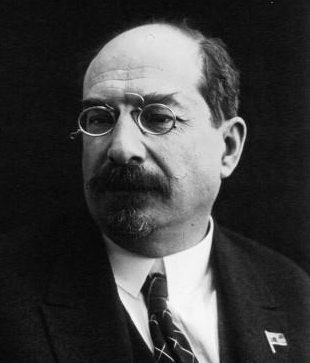
Anatoly Vasilyevich Lunacharsky was a Russian Marxist revolutionary and the first Bolshevik Soviet People's Commissar (Narkompros) responsible for the Ministry of Education as well as an active playwright, critic, essayist, and journalist throughout his career.
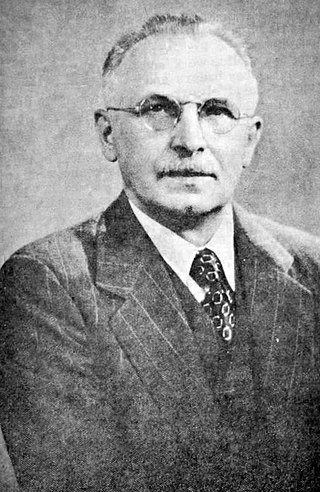
Grigorii Petrovich Maksimov was a Russian anarcho-syndicalist. From the first days of the Russian Revolution, he played a leading role in the country's syndicalist movement – editing the newspaper Golos Truda and organising the formation of factory committees. Following the October Revolution, he came into conflict with the Bolsheviks, who he fiercely criticised for their authoritarian and centralist tendencies. For his anti-Bolshevik activities, he was eventually arrested and imprisoned, before finally being deported from the country. In exile, he continued to lead the anarcho-syndicalist movement, spearheading the establishment of the International Workers' Association (IWA), of which he was a member until his death.

Nikolai Ilyich Podvoisky was a Russian Bolshevik revolutionary, Soviet statesman and the first People's Commissar of Military and Naval Affairs of the Russian SFSR.
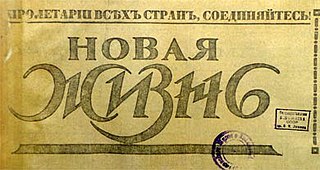
Novaya Zhizn was a daily newspaper published by a group of Mensheviks associated with the literary magazine Letopis, including Nikolai Sukhanov, Vladimir Bazarov, Stroev, Denitsky and A. N. Tikhonov. It was published in Petrograd from 18 April 1917 until 16 July 1918 and then in Moscow from June to July 1918, when it was closed down. The most known contributor was Maxim Gorky. The Swedish correspondent of the newspaper was Paul Olberg. Its run was interrupted in September 1917, when publication was suspended on the orders of the Russian Provisional Government.
Prosveshcheniye was a legal Bolshevik socio-political and literary monthly magazine in Russia.

The Moscow uprising, centered in Moscow's Presnensky district between 7 and 18 December 1905, was the climax of the Russian Revolution of 1905. Thousands of workers joined an armed rebellion against the imperial government fighting for better societal conditions. The uprising ended in defeat for the revolutionaries and provoked a swift counter-revolution that lasted until 1907. The revolution of 1905 was a turning point in Russian history, and the Moscow uprising played an important role in fostering revolutionary sentiment among Russian workers. The Moscow revolutionaries gained experience during the uprising that helped them succeed years later in the October Revolution of 1917.

Niva (Grainfield) was the most popular magazine of late-nineteenth-century Russia; it lasted from 1870 to 1918, and defined itself on its masthead as "an illustrated weekly journal of literature, politics and modern life." Niva was the first of the Russian "thin magazines," illustrated weeklies that "contrasted with the more serious and ideologically focused monthly 'thick journals' intended for the educated reader."

Nikolai Nikolaevich Himmer ; commonly known as Nikolai Sukhanov was a Russian Menshevik Internationalist and chronicler of the Russian Revolution. On June 29, 1940, he was convicted on false charges by the Soviet government and shot. After Stalin's death he was rehabilitated.
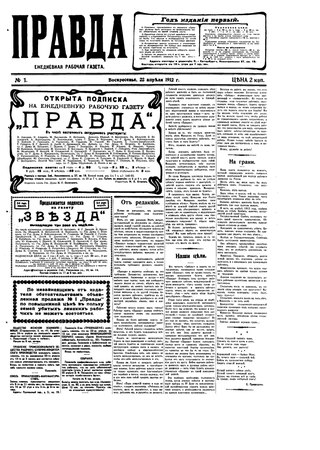
Pravda is a Russian broadsheet newspaper, and was the official newspaper of the Central Committee of the Communist Party of the Soviet Union, when it was one of the most influential papers in the country with a circulation of 11 million. The newspaper began publication on 5 May 1912 in the Russian Empire but was already extant abroad in January 1911. It emerged as the leading government newspaper of the Soviet Union after the October Revolution. The newspaper was an organ of the Central Committee of the CPSU between 1912 and 1991. After the dissolution of the Soviet Union, Pravda was sold by the then Russian president Boris Yeltsin to a Greek business family in 1992, and the paper came under the control of their private company Pravda International.

Alexander Lvovich Parvus, born Israel Lazarevich Gelfand and sometimes called Helphand in the literature on the Russian Revolution, was a Marxist theoretician, publicist, and controversial activist in the Social Democratic Party of Germany.
Russian Mind is a pan-European sociopolitical and cultural magazine, published on a monthly basis both in Russian and in English. The modern edition follows the traditions of the magazine laid down in 1880 by its founder, Vukol Mikhailovich Lavrov. At the time of its first publications, Russkaya Mysl,, adhered to moderate constitutionalism – the idea which paved the way for the ideological and organizational creation of the Cadet Party.

The April Crisis, which occurred in Russia throughout April 1917, broke out in response to a series of political and public controversies. Conflict over Russia's foreign policy goals tested the dual power arrangement between the Petrograd Soviet and the Russian Provisional Government. The Executive Committee and the full Soviet endorsed Nikolai Sukhanov's "An Appeal to All the Peoples of the World", which renounced war and "acquisitionist ambitions." This appeal conflicted with the Provisional Government's position on annexations, and Foreign Minister Pavel Milyukov responded with the Milyukov note on 18 April declaring Russia's right to Constantinople and the Dardanelles.

Yuliy Osipovich Tsederbaum, better known as Julius Martov, was a Russian revolutionary, politician, and the leader of the Mensheviks, a faction of the Russian Social Democratic Labour Party (RSDLP). A close associate of Vladimir Lenin prior to 1903, Martov broke with him following the RSDLP's ideological schism, after which Lenin led the opposing faction, the Bolsheviks.

Zinovii Isaevich Grzhebin (Russian: Зиновий Исаевич Гржебин was a Russian publisher and caricature illustrator. He represented more than 20% of the publishing market in Russia in the early 1910s and made a significant impact on development of the Russian book publishing industry.

The Second All-Russian Congress of Soviets of Workers' and Soldiers' Deputies was held on November 7–9, 1917, in Smolny, Petrograd. It was convened under the pressure of the Bolsheviks on the All-Russian Central Executive Committee of the First Congress of Soviets of Workers' and Soldiers' Deputies.
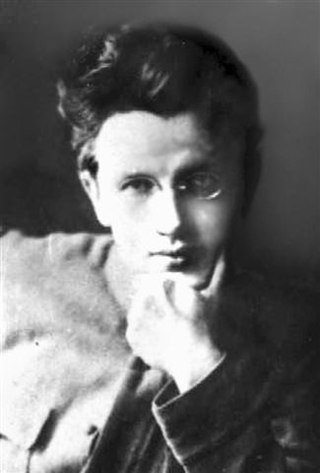
Nikolai Gurevich Tolmachyov was a Russian Bolshevik revolutionary and participant of the February and October Revolutions, the Civil War. He was a political worker of the Red Army and one of the first military commissars.

Novyi Satirikon was a Russian language weekly humor and satirical magazine that was published in Saint Petersburg in the period 1908–1914. During the 1917 Revolution, the magazine held an anti-Bolshevik political stance, and most of its contributors had to flee Russia after the magazine was closed in 1918.
References
- 1 2 3 4 5 "Saint Petersburg encyclopaedia". www.encspb.ru. The Likhachev Foundation. Retrieved 3 October 2017.
- ↑ Sukhanov, Nikolai Nikolaevich (2014). The Russian Revolution 1917: A Personal Record by N.N. Sukhanov. Princeton: Princeton University Press. ISBN 9781400857104 . Retrieved 3 October 2017.
- ↑ Josephson, Paul R. (1991). Physics and Politics in Revolutionary Russia. University of California Press. ISBN 978-0-520-91147-5.